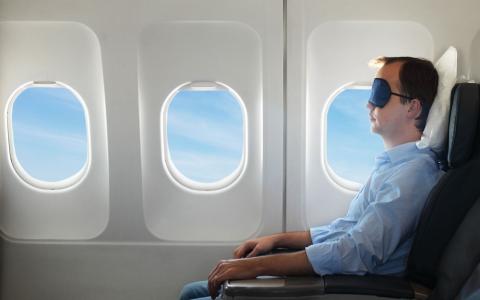
(Bustle) If you're a night owl, an early bird or don't get a lot of sleep at all, you're likely used to seeing it affect your social life and relationships. For instance, it can be tricky to make living with a partner with an incompatible sleep schedule work. However, science shows that your sleeping style can also affect your career, from the ways in which you show productivity to your happiness in the workplace.
A survey of 1,011 people by mattress company The Sleep Judge found that sleep-deprived people were more likely to be searching for new jobs and dissatisfied with the ones they had, particularly if they worked in retail, technology, or hospitality. If you've been feeling motivated to look for new work or experiencing some severe dissatisfaction with your current role, feeling sleep-deprived might actually push you over the edge — even if your sleep deprivation has nothing to do with your current job at all.
We can experience sleep deprivation for many different reasons, including sleep fragmentation, where sleep is regularly interrupted in the night, and sleeping schedules that don't actually line up with our body's internal clock. If you're a true night owl who can't get off to sleep till long after everybody else is slumbering, it's possible that you have delayed sleep phrase syndrome, and that can actually make you more vulnerable to sleep deprivation overall — and more likely to feel unhappy at your job as a result. A 2015 study found that night owls feel the effects of sleep deprivation more than people who naturally sleep and wake early in the night. Cue more unhappiness when you get to work in the morning.
If you're staying in a job that doesn't sit at all well with your sleeping habits, you're likely not as productive as you could be — and that has potential wide-ranging repercussions. A 2018 study in the journal Sleep found that in Australia alone, sleep deprivation cost the economy $45.21 billion from 2016 to 2017. The U.S. economy, according to a 2016 study, loses a whopping $411 billion a year because of sleep-deprived workers, Forbes found. Sleep deprivation is bad for your brain; Forbesexplained in 2014 that it affects "mood, ability to focus, and access to higher-level brain functions for days to come," to the point where drunk people can outperform sleep-deprived subjects on cognitive tests.
If you do have a job where you're likely to get a lot of shut-eye, however, it's more likely that you'll be happy with your position. A Center for Disease Control And Prevention study in 2013-2014 found that people who work in farming, fishery and forestry, education and libraries, community and social services, science, and computer and mathematical services were the ones most likely to get enough sleep.
Unsurprisingly, there's quite a lot of crossover between this list and data about the happiest industries; the farming, fishing and forestry industry is the happiest of all,according to a 2012 study in the UK. Industries that involve making your own hours(and so suiting your own sleep schedule), like consulting, also tend to be high on happiest-industry lists.
Millennial sleeping habits in general are argued to be affecting the job market as a whole. According to Forbes in 2017, millennials are sleeping more hours a night than earlier generations, and that's both shaping the world of jobs and beingshaped by it. We're getting more sleep partly because of our higher rates of unemployment — 14 percent of 25-to-35 year old men were unemployed in 2016, compared to 6.4 percent in 1996, according to Bloomberg. However, that's not the whole story; we're also demanding jobs that accommodate better schedules and more flexibility, which, Forbes argues, is part of the reason that flexible hours are popular among young workers and people are quitting positions in search of better work-sleep balance.
The big picture? Sleep habits can definitely affect your career — as they can influence your happiness in your job, your productivity, your willingness to emphasize flexibility and your stress levels. If you're getting enough sleep, or have a job where you're able to fit your own sleep schedule, you're in a good position to watch your career flourish. You snooze, you win.



